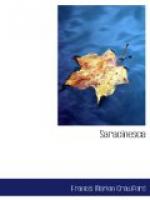the engineer they employed, and often looking forward
to the day when for the first time their carriage should
roll smoothly down from Saracinesca to Astrardente
without making the vast detour which the old road
followed as it skirted the mountain. There was
an inexpressible pleasure in watching the growth of
the work they had so long contemplated, in speculating
on the advantages they would obtain by so uniting
their respective villages, and in feeling that, being
at last one, they were working together for the good
of their people. For the men who did the work
were without exception their own peasants, who were
unemployed during the winter time, and who, but for
the timely occupation provided for them, would have
spent the cold months in that state of half-starved
torpor peculiar to the indigent agricultural labourer
when he has nothing to do—at that bitter
season when father and mother and shivering little
ones watch wistfully the ever-dwindling sack of maize,
as day by day two or three handfuls are ground between
the stones of the hand-mill and kneaded into a thick
unwholesome dough, the only food of the poorer peasants
in the winter. But now every man who could handle
pickaxe and bore, and sledge-hammer and spade, was
out upon the road from dawn to dark, and every Saturday
night each man took home a silver scudo in his pocket;
and where people are sober and do not drink their wages,
a silver scudo goes a long way further than nothing.
Yet many a lean and swarthy fellow there would have
felt that he was cheated if besides his money he had
not carried home daily the remembrance of that tall
dark lady’s face and kindly eyes and encouraging
voice, and they used to watch for the coming of the
“
gran principessa” as anxiously
as they expected the coming of the steward with the
money-bags on a Saturday evening. Often, too,
the wives and daughters of the rough workers would
bring the men their dinners at noonday, rather than
let them carry away their food with them in the morning,
just for the sake of catching a sight of Corona, and
of her broad-shouldered manly husband. And the
men worked with a right good will, for the story had
gone abroad that for years to come there would be
no lack of work for willing hands.
So the days sped, and were not interrupted by any
incident for several weeks. One day Gouache,
the artist Zouave, called at the castle. He had
been quartered at Subiaco with a part of his company,
but had not been sent on at once to Saracinesca as
he had expected. Now, however, he had arrived
with a small detachment of half-a-dozen men, with instructions
to watch the pass. There was nothing extraordinary
in his being sent in that direction, for Saracinesca
was very near the frontier, and lay on one of the
direct routes to the Serra di Sant’ Antonio,
which was the shortest hill-route into the kingdom
of Naples; the country around was thought to be particularly
liable to disturbance, and though no one had seen a
brigand there for some years, the mountain-paths were
supposed to be infested with robbers. As a matter
of fact there was a great deal of smuggling carried
on through the pass, and from time to time some political
refugee found his way across the frontier at that point.




